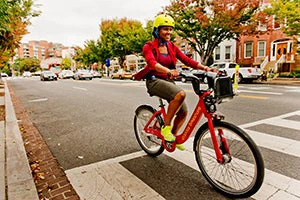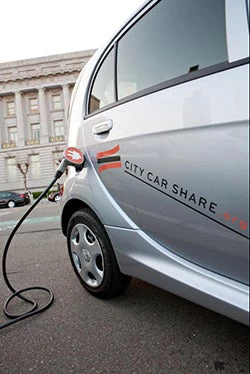Follow the author on Twitter:
@shomik_raj

Photo: Sam Kittner / Capital Bikeshare The sharing economy has been around for a long time. But recent technological advances like the development of real-time transactions through smartphones and credit cards have taken the potential of the shared economy to a whole new level, and opened the door for substantial changes in the way we think about urban mobility.
Recently, I was invited to join a panel on the sharing economy moderated by Prof. Susan Shaheen at UC Berkeley, focusing more specifically on shared mobility.
The panel acknowledged that shared mobility is already transforming the mobility landscape globally, but could go a lot further in increasing the sustainability of urban mobility systems. The panel identified a number of key research gaps that we need to pay close attention to if we want to create a policy environment that is conducive to mobility innovations. Three that I want to highlight are:

Photo: City CarShare Also, as part of this panel I learnt a lot from pioneers in this rapidly evolving space. Ed Reiskin, Director of Transport for San Francisco, emphasized the need to create 'safe spaces' to discuss, pilot and evaluate innovations in shared mobility so policymakers can adapt to and keep up with this rapidly-evolving market. Neal Gorenflo, CEO of the non-profit
Shareable, eloquently explained how a new combination of values – particularly environmental consciousness, tastes and technology, is creating an economy where increasing numbers of people prefer 'sharing' to 'owning' items, from cars and bikes to jewelry, clothes and tools. Rick Hutchinson, CEO of a not-for-profit carsharing network, noted that each shared vehicle his firm puts into service is estimated to take at least 9 cars off the road; Mr. Hutchinson also argued that commercial services that use public right-of-way at no cost had some implicit obligations to society in return, like possibly sharing speed and traffic data with authorities. Michael Jones, who manages bike-share systems in cities including Washington DC, New York and San Francisco talked about how ridership on all those systems was exceeding expectations but argued for more flexibility with pricing and terms to ensure the long-term financial sustainability of bikeshare, particularly in cases where local government has strong views on geographic location and service standards. I also brought to the debate the Latin American experience in the shared mobility space -- from commuter shuttles in Sao Paulo to the successful bike share system of Buenos Aires. Furthermore, I explained how innovations like taxi apps in Mexico City or Bogota are enhancing the quality of existing options.
Finally, all the panelists ended by linking shared mobility to more fundamental concerns about equity, public space and environmental conservation. For my part, I noted that most examples of the sharing economy are about exchanging ‘ownership’ for ‘membership’, such as renouncing to own a car and choose to use one in a secure private sharing-network instead. That's great and that's fine but we have to be careful that, as we leverage the new possibilities of shared mobility, not to turn public transport into a host of privatized, members-only clubs. As Jane Jacobs would say, the essence of the urban experience that creates tolerance for differences, encourages art, literature and innovation -- what makes cities the cradle of civilization - is arguably public space. And public transport, although it was not necessarily designed with that purpose in mind, has become an essential component of public space. Let’s make sure we keep it that way.

Photo: Sam Kittner / Capital Bikeshare
Recently, I was invited to join a panel on the sharing economy moderated by Prof. Susan Shaheen at UC Berkeley, focusing more specifically on shared mobility.
The panel acknowledged that shared mobility is already transforming the mobility landscape globally, but could go a lot further in increasing the sustainability of urban mobility systems. The panel identified a number of key research gaps that we need to pay close attention to if we want to create a policy environment that is conducive to mobility innovations. Three that I want to highlight are:
- Supporting open data and open-source ecosystems is critical considering the tremendous potential of open-source software and data-sharing for improving transport planning, facilitating management and providing a better experience for transport users (for more detail, please see my previous blog on how the transport sector in Mexico is being transformed by open data)
- Looking into shared-economy solutions for those at the bottom of the pyramid – solutions that don’t require credit cards and smartphones as prerequisites (see this blog on the bike-share system in Buenos Aires for a good example)
- The world of driverless cars is coming – which, depending on how policy responds to it, could spell really good or really bad news for the environment: if such technology is used primarily in shared mobility scenarios, it could greatly reduce the environmental cost of motorized transport; on the other hand, the possibility of “empty trips” with zero-occupancy cars could exacerbate the worst elements of automobility (see Robin Chase’s blog in The Atlantic Cities for a great discussion on this). That is why it is critical to create a policy environment that appropriately prices the ‘bads’ of congestion, accidents and emissions while steering the world of driverless cars towards sharing and resource conservation.

Photo: City CarShare
Finally, all the panelists ended by linking shared mobility to more fundamental concerns about equity, public space and environmental conservation. For my part, I noted that most examples of the sharing economy are about exchanging ‘ownership’ for ‘membership’, such as renouncing to own a car and choose to use one in a secure private sharing-network instead. That's great and that's fine but we have to be careful that, as we leverage the new possibilities of shared mobility, not to turn public transport into a host of privatized, members-only clubs. As Jane Jacobs would say, the essence of the urban experience that creates tolerance for differences, encourages art, literature and innovation -- what makes cities the cradle of civilization - is arguably public space. And public transport, although it was not necessarily designed with that purpose in mind, has become an essential component of public space. Let’s make sure we keep it that way.


Join the Conversation